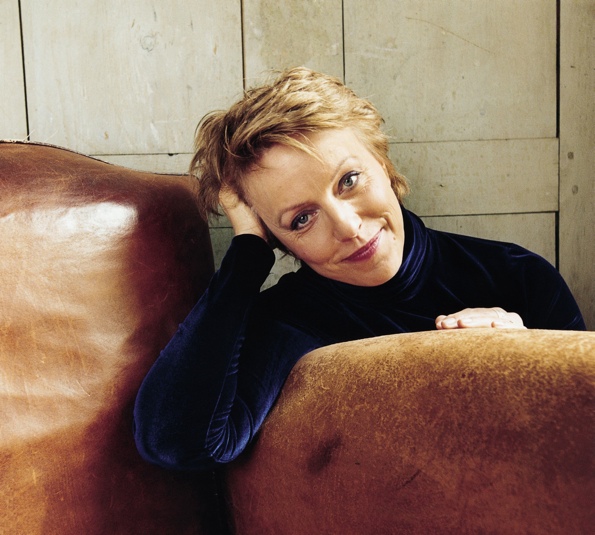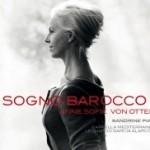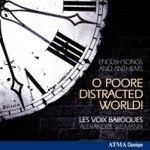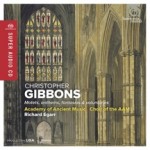
ANNE SOFIE VON OTTER
Sogno Barocco (Naïve)
Sultry-voiced Swedish mezzo Anne Sofie von Otter uses her remarkable powers of musical persuasion to guide us through a mesmerizing selection of arias from early 17th century Italy, the cradle of opera.
- Classical Music 101: What Does A Conductor Do? - June 17, 2019
- Classical Music 101 | What Does Period Instrument Mean? - May 6, 2019
- CLASSICAL MUSIC 101 | What Does It Mean To Be In Tune? - April 23, 2019
 Many young composers of the time were building a new foundation for music, using the modern system of fixed keys rather than modes and trying to match the meaning of text in song with corresponding harmonies and figures in its instrumental accompaniment.
Many young composers of the time were building a new foundation for music, using the modern system of fixed keys rather than modes and trying to match the meaning of text in song with corresponding harmonies and figures in its instrumental accompaniment.
Much of the singing needs to convey a state of mind rather than distract its listeners with garlands of decorative runs and trills (which came along soon enough afterward).
The best-known composer of what was called the New Music is Claudio Monteverdi (1567-1643). Arias from his operas L’incoronazione di Poppea and Il ritorno d’Ulisse in patria, are joined by the work of Francesco Provenzale (1624-1704), Francesco Cavalli (1602-1676) and Luigi Rossi (1598-1653), making for a rich, affecting tapestry of early-Baroque Italian songcraft.
This exquisite album includes three duets, two sung with soprano Sandrine Piau and one by contralto Susanna Sundberg. The delicately crafted accompaniments by harpsichordist Leonardo García Alarcón and his 7-year-old consort, Ensemble Cappella Mediterranea, help weave a magical spell, augmented by instrumental interludes between arias.
This is one of those discs where there isn’t a single star, but von Otter deserves special mention for the high level of expression and nuance she brings to her art. As Garía Alarcón puts it in the comprehensive booklet, “The voice of Anne Sofie von Otter revealed to us worlds previously unknown and succeeded in extracting from our instruments sounds previously unsuspected. Her voice creates forms in space which will forever remain for us an example of the way an artist should tackle a repertoire — a subtle blend of intelligence, curiosity, freshness, and rigour, always accompanied by surprising creative innovation.”
Not much more need be said, apart from the fact that this is a magnificent voyage of discovery, guided in favour of the lament, which always makes for the most affecting listening. But there is dancing here, too, to make sure we don’t get too wrapped up in melancholy.
To demonstrate, here is the promotional video from the album:
 LES VOIX BAROQUES
LES VOIX BAROQUES
O Poore Distracted World (ATMA Classique)
The title of this album has nothing to do with texting while driving, or trying to respond to email while standing in line at the grocery checkout. Instead, it is all about channeling sadness and melancholy into a musical, spiritual plane.
Before bouncy Herr Handel came along in the 18th century, English people loved a good, sad art song (like one of John Dowland’s many) or church anthem. For the singer and listener, it can be cathartic to plumb deep emotions. For instrumentalists and composers, it’s an excuse to subtly explore the limits of their craft.
Montreal countertenor Matthew White and his (not so merry here) band Les Voix Baroques have pulled together 12 anthems that explore — and redeem — a person rejected or dejected.
There are three pieces by the master of English music from the early Baroque, Henry Purcell (1659-1695), as well as selections from Matthew Locke (1622-1677), John Blow (1649-1708) and Thomas Weelkes (1576-1623) and composers lesser known outside the Anglican church, including John Coperario (named Cooper until he got all fancy and Italian), who supplies the funeral meditation that gave this album its title.
There are tremendous solo singers at work here, including wonderful Toronto soprano Shannon Mercer. Tenor Charles Daniels and baritone Tyler Duncan are regular concert guests in this city. Alexander Weimann directs a small period-instrument consort with subtle skill.
According to the liner notes, this recording has sat unpublished for three years, so it’s great to finally have it out. The sound, captured at the Unitarian Church of Victoria, is, unfortunately, a bit dry.
 ACADEMY OF ANCIENT MUSIC/EGARR
ACADEMY OF ANCIENT MUSIC/EGARR
Christopher Gibbons — Motets, anthems, fantasias & voluntaries (Harmonia Mundi)
Dynamic English keyboardist and conductor Richard Egarr (an occasional Tafelmusik guest) was reading the Diary of Samuel Pepys when he realised that the “Mr. Gibbons” the famous chronicler refers to couldn’t have been the well-known late-Renaissance composer Orlando Gibbons. Several years of reading and digging around libraries in Oxford and London turned up the work of the man’s son, Christopher Gibbons (1615-1676).
Just when it might have been safe to think that all of the truly great music of the early Baroque had been dusted off, here was a reminder that a lot of potential treats still sit unappreciated in libraries and dry attics.
Egarr, working with the Academy of Ancient Music and its youthful choir, has assembled a neatly layered concert that mixes church anthems (the younger Gibbons was the first organist appointed at Westminster Abbey after the Restoration) with organ voluntaries and instrumental fantasies (England’s version of the Baroque dance suite), all exquisitely played and sung.
It looks like this is the first time any of this music has been recorded. The fine selection and interpretations we get make it every bit as worthy of our love as the works of Henry Purcell.
John Terauds
- Classical Music 101: What Does A Conductor Do? - June 17, 2019
- Classical Music 101 | What Does Period Instrument Mean? - May 6, 2019
- CLASSICAL MUSIC 101 | What Does It Mean To Be In Tune? - April 23, 2019



